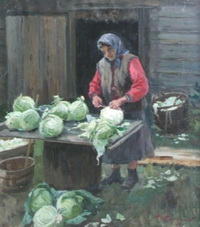
N. Sisoev `Cutting cabbage for pickling in a village`, 1966
|
I was born in 1918 at the small village of Kholmi, near the border of Smolensk
area (Russia) and Belarus, about 20 miles from Petrovichi.
The village consisted of 100 households with 15 out of 100 being Jewish. My
mother, Masya (Mikhlina) Katz(1882-1959) was cantor Abram Mikhlin’s daughter.
My father, Isaac Katz(1880-1971) was a farmer. The family consisted of my 5
siblings, one orphan and the rebbe, our Hebrew teacher, whom my parents agreed
to feed as a part of a teaching deal. Life was tough.
This story takes place in the late 1920s. My father, Isaac Katz, decided to
visit his neighbor Ivan and order the extra-large wooden barrel for the pickled
cabbage, which was the staple of our diet at the time. I asked to go with him.
Our family was large, consisting of eight people, and the regular size barrel
was not enough for the whole winter.
|